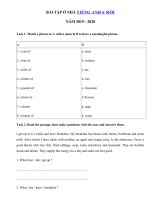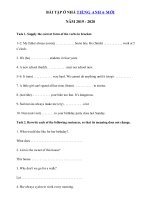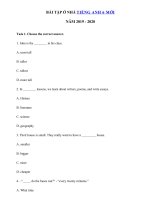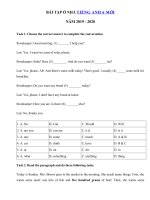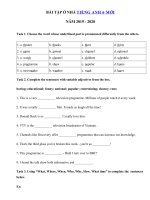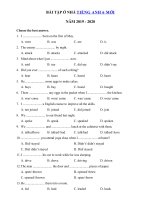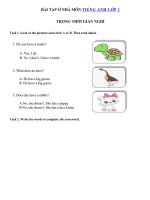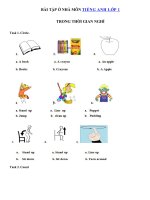Đề cương ôn tập Tiếng anh lớp 7 Giữa học kì 2
Bạn đang xem bản rút gọn của tài liệu. Xem và tải ngay bản đầy đủ của tài liệu tại đây (187.46 KB, 12 trang )
<span class='text_page_counter'>(1)</span><div class='page_container' data-page=1>
<b>ĐỀ CƯƠNG ƠN TẬP GIỮA KÌ II</b>
<b>MƠN: TIẾNG ANH LỚP 7 </b>
<b>NĂM HỌC 2020-2021</b>
<b>I. PHONETICS</b>
<b>Sounds: </b>
/e/
/eɪ/
‘ed’ được phát âm
là /t/
‘ed’ được phát âm là /d/
‘ed’ được phát âm
là /ɪd/
best
place
Sau các âm /
<i><b>t</b></i>
<b>/ và /</b>
<i><b>d</b></i>
/
Sau các âm /
<i><b>s</b></i>
/, /
<i><b>k</b></i>
/, /
<i><b>p</b></i>
/, /
<i><b>ʈʃ</b></i>
/
và /
<i><b>ʃ</b></i>
/
Sau các âm còn lại
wanted, needed
passed, liked, stopped,
watched, washed
dreamed, studied
<b>Stress and tone</b>
Stress in two-syllable words: trọng âm từ hai âm tiết
<b>II. VOCABULARY: </b>
<b>Topics</b>
<b>Means of transport</b>
<b>Road signs</b>
bike/ bicycle; bus; plane; boat; ship; train;
motorbike; car
no right turn; traffic lights; cycle lane; hospital
ahead; parking; no parking; no cycling; school
ahead
<b>Common expressions related to traffic</b>
<b>Types of films</b>
traffic jam; zebra crossing; road users; driving
license; speed limit; railway station; train
ticket; means of transport
science fiction (sci-fi ); romantic comedy;
thriller; comedy; documentary; animation;
action; horror
<b>Adjectives to describe films</b>
<b>Types of festivals</b>
boring; entertaining; hilarious; violent;
gripping; moving; scary; shocking
religious; seasonal; music/arts; superstitious
<b>III. GRAMMAR </b>
<b>a. Hiện tại đơn </b>
(Hiện tại đơn)
<b>b. Simple future </b>
(Tương lai đơn)
<b>Khẳng định</b>
<b>Phủ định</b>
<b>Câu hỏi</b>
I/ you/ we/ they/ she/
he/ it
<b>will V </b>
I/ you/ we/ they/ she/ he/ It
<b>won’t</b>
<b>V</b>
<b>Will</b>
I/ you/ we/ they/ she/ he/ it
<b>V</b>
?
Yes, I/ you/ we/ they/ she/ he/ it
<b>will</b>
.
No, I/ you/ we/ they/ she/ he/ it
<b>won’t</b>
.
<i>Cách dùng</i>
: được dùng để diễn tả hành động có thể xảy ra trong tương lai.
<b>c. Past simple (Quá khứ đơn)</b>
<b> Khẳng định</b>
<b>Phủ định</b>
<b>Câu hỏi</b>
I/ you/ we/ they/ she/ he/ it +
Ved/V irregular
I/ you/ we/ they/ she/ he/ it + didn’t +
V.
</div>
<span class='text_page_counter'>(2)</span><div class='page_container' data-page=2>
No, S + didn’t.
You/we/they + were
I/he/she/it + was
You/we/they + were not (weren’t)
I/he/she/it + was not (wasn’t)
Were + you/we/ they?
Was + I/he/she/it?
Đa số động từ chia ở thì Quá khứ đơn tuân theo quy tắc: look – looked, nhưng một số động từ không
tuân theo quy tắc: go – went (
<i>học thuộc lòng bảng động từ bất quy tắc cột 2</i>
)
Cách dùng: dùng để nói về hành động đã xảy ra và chấm dứt trong quá khứ không liên quan tới hiện
tại.
Trạng từ thường gặp:
<b> yesterday, last week/ summer/ year/ etc, in January/ 2001/ etc., an hour/ a </b>
<b>week/ a year ago.</b>
<b>d. Present Perfect (Hiện tại hoàn thành)</b>
<b> Khẳng định</b>
<b>Phủ định</b>
<b>Câu hỏi</b>
I/you/we/they + have + PII
I/you/we/they + haven’t + PII
Have + you/we/they + PII?
Yes, I/we/they have.
No, I/we/they haven’t.
He/she/it + has + PII.
He/she/it + has + PII.
Has + he/she/it + PII?
Yes, he/she/it has.
No, he/she/it hasn’t.
Hầu hết các động từ chia ở phân từ II tuân theo quy tắc thêm ‘ed’: cook – cooked, finish – finished,
nhưng một số động từ bất quy tắc như: write – written
<b>●</b>
Cách dùng; sử dụng động từ chia ở thì hiện tại hồn thành để nói hành động đã bắt đầu từ quá khứ kéo
dài đến hiện tại và cịn có khả năng tiếp diễn tới tương lai. Ví dụ: I have learned English for five
years.
<b>●</b>
Dùng để chỉ kinh nghiệm, trải nghiệm (thường có số lần thực hiện được đề cập). Ví dụ: It’s the first
time I have visited Hanoi.
<b>●</b>
Trạng từ thường gặp:
<b>for, just, since, already, yet, ever, never, It’s the first time, three times, so </b>
<b>far, before, once.</b>
<b>e. ‘It’ </b>
indicating distance
<i>(khoảng cách)</i>
<i>Example:</i>
It is about 300 metres from my house to the bus stop.
<b>f. Used to </b>
for past habits or states (
<i>đã từng: dùng để chỉ thói quen trong quá khứ</i>
)
We use
<i><b>“used to”</b></i>
to describe an action, a habit or a state that happened regularly in the past but
doesn’t happen now.
(+)
I/We/You/They/He/She/It used to walk to school.
(-)
I/We/You/They/He/She/It did not use to walk to school.
(?)
Did I/We/You/They/He/She/It use to walk to school?
<b>g. Connectors (</b>
<i><b>từ nối chỉ sử tương phản</b></i>
<b>): although, despite/ in spite of, however, and </b>
<b>nevertheless</b>
We use although, despite/in spite of to express contrast between two pieces of information in the
same sentence.
We use although before a clause and despite/in spite of before a noun or a noun phrase.
<i>Example: </i>
Although he is so young, he performs excellently.
= Despite/In spite of being so young, he performs excellently.
= Despite/In spite of his young age, he performs excellently.
<b>h. -ed and -ing adjectives:</b>
</div>
<span class='text_page_counter'>(3)</span><div class='page_container' data-page=3>
<i>Example:</i>
The film was long, and I was bored.
We use –ing adjectives to describe things or people (that cause the feelings).
<i>Example:</i>
The film was long, and boring.
<b>i. H/ Wh</b>
-questions
<b>Type/Question</b>
<b>Example</b>
Time
(when?)
The Festival of the Sun is held on June 24th.
Place
(where?)
The festival is celebrated in Peru.
Frequency
(how often?)
The festival takes place every year.
Reason
(why?)
People attend the festival for fun.
A lot of people go to Cusco, Peru, to attend the festival.
Manner
(how?)
People celebrate it in a special way.
<b>People celebrate it with street fairs and live music.</b>
<b>j. Adverbial phrases</b>
Adverbial phrases made with nouns: every year, last week
Adverbial phrases made with prepositions: in 2013, in a small town, with beautiful plants
Adverbial phrases made with to-infinitive: to enjoy the party, to have more friends
<b>IV. TYPE OF EXERCISES</b>
<b>PART A: USE OF LANGUAGE </b>
(phonetics, vocabulary and grammar)
Multiple choice
Word formation
Identify the mistakes and correct them
Sentence completion
<b>PART B: READING</b>
True/ False/ Not given
Multiple choice
Question answer
Sentence/ Summary completion
<b>PART C: WRITING </b>
</div>
<span class='text_page_counter'>(4)</span><div class='page_container' data-page=4>
<b>PRACTICE TEST 1</b>
<b>Find the word which has different sound in the underlined part.</b>
1. A. r
<b>e</b>
st
B. h
<b>e</b>
lp
C. gard
<b>e</b>
n
D. id
<b>e</b>
ntify
2. A. tr
<b>a</b>
ffic
B. p
<b>a</b>
vement
C. pl
<b>a</b>
ne
D. st
<b>a</b>
tion
<b>Choose a word in each line that has different stress pattern.</b>
3. A. harvest
B. famous
C. design
D. festival
4. A. party
B. season
C. parade
D. concert
<b>Choose the best answer (A, B, C or D).</b>
5. Drivers have to ____________ their seatbelt whenever they drive.
A. put
B. tie
C. fasten
D. put on
6. ____________ does it take you to get to Ho Chi Minh City by plane? - About 2 hours.
A. How long
B. How much
C. How far
D. How many
7. All of us have to obey ____________ strictly.
A. traffic rules
B. traffic
C. traffic jam
D. regular
8. Cyclists and motorists have to wear a ____________ when they ride a motorbike.
A. hard hat
B. cap
C. mask
D. helmet
9. He forgot to give a ____________ before he turned left and got a ticket.
A. signal
B. sign
C. light
D. hand
10. Linda used to ____________ morning exercise when she got up early.
A. did
B. does
C. doing
D. do
11. My mum ____________ the bus to work every day, but I cycle.
A. catches
B. drives
C. goes
D. runs
12. You should look right and left when you go ____________ the road.
A. down
B. across
C. up
D. along
13. Bus is the main public ____________ in Viet Nam.
A. travel
B. tricycle
C. transport
D. vehicle
14. The play was so boring. ____________, An saw it from beginning to end.
A. Therefore
B. Despite
C. However
D. Although
15. A lot of dancers go to Rio de Janeiro to____________ the Carnival.
A. attend
B. play
C. perform
D. appear
16. ____________ the film was gripping, Tom slept from beginning to end.
A. Therefore
B. Despite
C. However
D. Although
17. The movie on TV last night made me ____________ .
A. bore
B. boring
C. bored
D. boredom
18. I was ____________ to learn that the director of that gripping film has won the first prize.
A. interest
B. interests
C. interested
D. interesting
19. We were ____________ with the latest film of that director.
A. satisfy
B. satisfying
C. satisfactory
D. satisfied
20. They were very disappointed ____________ her acting.
A. of
B. with
C. in
D. on
21. Let’s go to the Victor Cinema. I’m sure you'll find the film ____________ .
A. excites
B. excite
C. excited
D. exciting
22. Mr. Beans Holiday is a ____________ film - I was laughing from beginning to end.
A. hilarious
B. violent
C. scary
D. moving
<b>Circle the mistake in each sentence.</b>
23. It
<b>is</b>
sometimes
<b>embarrassed</b>
when you
<b>have to</b>
ask people
<b>for</b>
money.
A
B
C
D
24. I had never
<b>expected</b>
to be
<b>offered</b>
the job. I was really
<b>amazing</b>
when I
<b>was</b>
offered it.
</div>
<span class='text_page_counter'>(5)</span><div class='page_container' data-page=5>
25. The film
<b>is</b>
a big
<b>disappoint</b>
. It is
<b>boring</b>
from beginning
<b>to</b>
end.
A
B
C
D
<b>Choose a suitable word for each blank.</b>
Yesterday, Carlos went to La Tomatina. The festival is held on the last Wednesday of August every
year in Buñol, Spain. (26) _______ were thousands of people there. In the morning, many people tried
to climb up the pole to get the ham. At 11 a.m, they (27) _______ a jet from the water cannons and the
chaos began. Bags of tomatoes from trucks were thrown to the crowds, and they began throwing
tomatoes at one another. They all had to wear goggle (28) _______ their eyes.
After one hour, they saw another jet and stopped throwing. The whole town square was red with
rivers of tomato juice. Finally, they tried tomato Paella, a (29) _______ Spanish rice dish. Together
with local people and tourists, they enjoyed the (30) _______ food and drink.
26. A. There
B. They
C. That
D. This
27. A. saw
B. see
C. seen
D. seeing
28. A. protecting
B. to protect
C. protected
D. protect
29. A. tradition
B. traditional
C. traditionally
D. traditionalize
30. A. badly
B. better
C. well
D. good
<b>Read the passage and choose the correct answer</b>
.
Yesterday, on the way home from school, I saw an accident. A boy was run over by a taxi when he was
riding his bicycle. The boy’s leg was broken and it was bleeding badly. Someone there tried to stop the
bleeding. They put pressure on it and held it tight. A man used his mobile phone to call the emergency
service. Some minutes later, an ambulance arrived and sent the boy to the hospital. Two policemen
came to the scene immediately. Some people told the police that the taxi driver was driving at a very
high speed when the accident happened. Some others began talking about the traffic accidents these
days and blamed the increasing number of accidents on the roads for careless driving and drunk drivers.
31. What did the writer see yesterday?
A. An accident
B. A fire
C. A fighting
D. A crash
32. The accident happened between a taxi and __________.
A. a bus
B. a bicycle
C. a car
D. motorbike
33. The boy was sent to the hospital by __________ .
A. a police
B. a car
C. a passenger
D. an ambulance
34. What part of his body was hurt? – His ___________.
A. arm
B. head
C. leg
D. shoulder
35. How was the driver driving when the accident happened? – Very ____________ .
A. fast
B. slowly
C. carefully
D. well
<b>Choose the correct sentence with the cues given.</b>
36. How far/ it/ your house/ the bookstore?
A. How far it is from your house to the bookstore?
B. How far was it from your house to the bookstore?
C. How far is it from your house to the bookstore?
D. How far is it from your house and the bookstore?
37. Mai/ use/ go/ school/ foot/ when/ she/ primary school.
A. Mai use to go to school on foot when she was in primary school.
B. Mai used to go to school by foot when she was in primary school.
C. Mai used to go to school on foot when she is in primary school.
D. Mai used to go to school on foot when she was in primary school.
38. It/ very important/ obey/ traffic rule/ when/ use/ road.
</div>
<span class='text_page_counter'>(6)</span><div class='page_container' data-page=6>
D. Although she was being scared, she enjoyed watching horror movies.
40. I/ look forward/ watch/ the samba parade/ Rio Carnival.
A. I am looking forward to watching the samba parade in Rio Carnival.
B. I am looking forward to watch the samba parade in Rio Carnival.
C. I am looking forward watching the samba parade in Rio Carnival.
D. I look forward watching the samba parade in Rio Carnival.
<b>PRACTICE TEST 2</b>
<b>Find the word which has different sound in the underlined part.</b>
1. A. pulled B. opened C. featured D. decided
2. A. matched B. dressed C. started D. washed
<b>Choose a word in each line that has different stress pattern.</b>
3. A. honor B. succeed C. gripping D. action
4. A. touching B. decide C. scary D. western
<b>Choose the best answer (A, B, C or D).</b>
5. I _________ a lot when I was younger.
A. use to swim B. used to swim C. used to swimming D. didn't used to swim
6. People__________ so often, or they just didn't travel at all.
A. used to travel B. used not to travel C. didn't used to travel D. didn’t use to travel
7. My brother _________ his leg in a car accident when he was 20.
A. breaking B. used to break C. uses to break D. breaks
8. _________ long hair when you were a teenager?
A. Used you to have B. Did you used to have
C. Did you use to have D. Are you used to having
9. My Grandpa never_________ coffee. He always drank tea.
A. uses to like B. used to like C. didn't use to like D. is used to like
10. “How far is Vung Tau from Ho Chi Minh City”-“____________________________”
A. It’s not very far B. it takes about two hours or more.
C. It’s about 120km D. You can get to Vung Tau by boat or bus.
11. We are really _________ about going to the cinema tonight.
A. excited B. interested C. amused D. pleased
12. The film was so _________ . However, my father saw it from beginning to end.
A. interesting B. exciting C. boring D. fascinating
13. We found the plot of the film _________ .
A. bored B. boring C. interested D. acting
14. I enjoyed the film on TV yesterday evening _________ nobody in my family liked it.
A. although B. yet C. in spite of D. so
15. Last night, I didn’t go to bed early _________ being very tired.
A. despite of B. in spite of C. although D. because
16. Villagers voluntarily contribute money and other thing to _________ the festival.
A. open B. celebrate C. remember D. set
17. A lot of dancers go to Rio de Janeiro to _________ the Rio Carnival.
A. play B. take C. attend D. follow
18. In La Tomatina, people get to throw tomatoes at _________.
A. themselves B. once C. together D. each other
19. People of _________ minorities in Phu Yen celebrate Hoi Mua Festival every March.
A. native B. local C. ethnic D. village
20. It is _________ to see elephants racing in the Elephant Race Festival in DakLak.
A. amaze B. amazing C. amazed D. amazement
21. La Tomatina is a _________ festival to celebrate the tornado harvest.
A. season B. seasonal C. year D. annually
22. Everybody loves going to the _________ festival.
A. music B. musical C. musicians D. musician
<b>Circle the mistake in each sentence.</b>
23. At Christmas, streets are often decorated with color lights and red banners.
A B C D
</div>
<span class='text_page_counter'>(7)</span><div class='page_container' data-page=7>
25. I don’t like horror films because they are too frightened for me.
A B C D
<b>Choose a suitable word for each blank.</b>
Staying safe on foot and bike
Look out for yourself and your friends when going out (26)______ foot or by bike. Choose the (27) _______
routes you can like quieter, slower roads, with pavements if you’re walking. It’s easy to get distracted by your
phone or by friends, but you need to be (28)________ to traffic. Put your phone away and take your earphones
(29)________ when crossing the road. Don’t trust that drivers will spot you and be able to stop in time – many
drivers go too fast and don’t (30) ________ enough attention, so anything you can do to protect yourself is a
good thing.
26. a. on b. in c. by d. with
27. a. safe b. safer c. safest d. safely
28. a. risky b. warning c. serious d. alert
29. a. off b. over c. out d. down
30. a. pay b. make c. turn d. take
<b>Read the passage and choose the correct answer.</b>
For hundreds of years, one remote hill in the middle of England has hosted one of the weirdest and most
hazardous festivals in the world. It’s the Cooper’s Hill Cheese Rolling Festival. The event is held every year at
the end of May. Some people believe that the festival originated from a tradition of rolling burning bundles of
sticks down the hill to celebrate the end of winter. Today, the festival has grown into an international event, with
over 15,000 participants and spectators from all over the world joining each year.
The rules are simple. A large wheel of cheese is rolled down the hill, and participants chase after it. The
first runner to make it to the bottom of the hill is the winner. The winner of the race is allowed to keep the cheese
as a prize. Cooper’s Hill is only 200 meters long, but it is very steep. As a result, racers do not run down the hill;
instead, they usually fall down the hill head over heels. This has led to a lot of accidents. For this reason, the
event was officially canceled in 2010. Outraged fans have continued the event unofficially since then.
31. What is the passage mainly about?
A. Different food festivals around the world
B. An unusual and dangerous festival in England
C. Tips for winning the race in the cheese rolling festival
D. The history of the Cheese Rolling Festival
32. What is the origin of the Cheese Rolling Festival?
A. It is held every year in May.
B. It takes place at Cooper’s hill in Gloucestershire.
C. It is held to represent the birth of the new year after winter.
D. It comes from the tradition of rolling burning bundles of sticks down the hill.
33. The word ‘outraged’ in the last sentence is closest in meaning to _______.
A. upset B. pleasant C. keen D. big
34. According to the passage, which of the following is true?
A. All the runners in the race are from England.
B. The race is dangerous because the hill is very long.
C. Most participants cannot stay on their feet while they run down the hill.
D. The winner is the first person to catch the cheese.
35. The festival was officially canceled in 2010 due to _________________________________.
A. a large number of participants B. the bad weather in Gloucestershire
C. the steep slopes of Cooper’s Hill D. the dangerous aspect of the event
<b>Choose the correct sentence with the cues given.</b>
36. My family and I / go / Thailand / last April / take part / the Songkran Festival.
A. My family and I go to Thailand last April to take part in the Songkran Festival.
B. My family and I went to Thailand last April taking part in the Songkran Festival.
C. My family and I went to Thailand in the last April to take part in the Songkran Festival.
D. My family and I went to Thailand last April to take part in the Songkran Festival.
37. Vietnamese people / prepare / Tet / clean / their houses / cook / traditional special foods.
A. Vietnamese people prepare for Tet by cleaning their houses and cooking traditional special foods.
B. Vietnamese people prepares for Tet by cleaning their houses and cooking traditional special foods.
C. Vietnamese people prepare for Tet by clean their houses and cook traditional special foods.
D. Vietnamese people prepare for Tet by cleaning their houses and cook traditional special foods.
38. I / use to / collect / stamp / when / I / primary school.
</div>
<span class='text_page_counter'>(8)</span><div class='page_container' data-page=8>
B. I use to collect stamps when I was in primary school.
C. I used to collect stamps when I was in primary school.
D. I used to collect stamps when I am in primary school.
39. you / go to the beach / when / you / live / in / Nha Trang?
A. Did you used to go to the beach when you lived in Nha Trang?
B. Was you used to going to the beach when you lived in Nha Trang?
C. Did you use to go to the beach when you live in Nha Trang?
D. Did you use to go to the beach when you lived in Nha Trang?
40. I / go / cinema / my friends / yesterday / feeling / very tired.
A. I went to the cinema with my friends yesterday although feeling very tired.
B. I went to the cinema with my friends yesterday despite of feeling very tired.
C. I went to the cinema with my friends yesterday despite the fact that very tired.
D. I went to the cinema with my friends yesterday in spite of feeling very tired.
<b>KEY – ĐÁP ÁN</b>
<b>PRACTICE TEST 1</b>
<b>Find the word which has different sound in the underlined part.</b>
1. A. r
<b>e</b>
st
B. h
<b>e</b>
lp
<b>C. garden</b>
D. id
<b>e</b>
ntify
2
<b>. A. traffic</b>
B. p
<b>a</b>
vement
C. pl
<b>a</b>
ne
D. st
<b>a</b>
tion
<b>Choose a word in each line that has different stress pattern.</b>
3. A. harvest
B. famous
<b>C. design</b>
D. festival
4. A. party
B. season
<b>C. parade</b>
D. concert
<b>Choose the best answer (A, B, C or D).</b>
5. Drivers have to ____________ their seatbelt whenever they drive.
A. put
B. tie
<b>C. fasten</b>
D. put on
6. ____________ does it take you to get to Ho Chi Minh City by plane? - About 2 hours.
<b>A. How long</b>
B. How much
C. How far
D. How many
7. All of us have to obey ____________ strictly.
<b>A. traffic rules</b>
B. traffic
C. traffic jam
D. regular
8. Cyclists and motorists have to wear a ____________ when they ride a motorbike.
A. hard hat
B. cap
C. mask
<b>D. helmet</b>
9. He forgot to give a ____________ before he turned left and got a ticket.
<b>A. signal </b>
B. sign
C. light
D. hand
10. Linda used to ____________ morning exercise when she got up early.
A. did
B. does
C. doing
<b>D. do</b>
11. My mum ____________ the bus to work every day, but I cycle.
<b>A. catches</b>
B. drives
C. goes
D. runs
12. You should look right and left when you go ____________ the road.
A. down
<b>B. across</b>
C. up
D. along
13. Bus is the main public ____________ in Viet Nam.
A. travel
B. tricycle
<b>C. transport</b>
D. vehicle
14. The play was so boring. ____________, An saw it from beginning to end.
A. Therefore
B. Despite
<b>C. However</b>
D. Although
15. A lot of dancers go to Rio de Janeiro to____________ the Carnival.
<b>A. attend </b>
B. play
C. perform
D. appear
16. ____________ the film was gripping, Tom slept from beginning to end.
A. Therefore
B. Despite
C. However
<b>D. Although</b>
17. The movie on TV last night made me ____________ .
</div>
<span class='text_page_counter'>(9)</span><div class='page_container' data-page=9>
18. I was ____________ to learn that the director of that gripping film has won the first prize.
A. interest
B. interests
<b>C. interested</b>
D. interesting
19. We were ____________ with the latest film of that director.
A. satisfy
B. satisfying
C. satisfactory
<b>D. satisfied</b>
20. They were very disappointed ____________ her acting.
A. of
<b>B. with</b>
C. in
D. on
21. Let’s go to the Victor Cinema. I’m sure you'll find the film ____________ .
A. excites
B. excite
C. excited
<b>D. exciting</b>
22. Mr. Beans Holiday is a ____________ film - I was laughing from beginning to end.
<b>A. hilarious</b>
B. violent
C. scary
D. moving
<b>Circle the mistake in each sentence.</b>
23. It
<b>is</b>
sometimes
<b>embarrassed</b>
when you
<b>have to</b>
ask people
<b>for</b>
money.
A
<b>B</b>
C
D
24. I had never
<b>expected</b>
to be
<b>offered</b>
the job. I was really
<b>amazing</b>
when I
<b>was</b>
offered it.
A
B
<b>C</b>
D
25. The film
<b>is</b>
a big
<b>disappoint</b>
. It is
<b>boring</b>
from beginning
<b>to</b>
end.
A
<b>B</b>
C
D
<b>Choose a suitable word for each blank.</b>
Yesterday, Carlos went to La Tomatina. The festival is held on the last Wednesday of August every
year in Buñol, Spain. (26) _______ were thousands of people there. In the morning, many people tried
to climb up the pole to get the ham. At 11 a.m, they (27) _______ a jet from the water cannons and the
chaos began. Bags of tomatoes from trucks were thrown to the crowds, and they began throwing
tomatoes at one another. They all had to wear goggle (28) _______ their eyes.
After one hour, they saw another jet and stopped throwing. The whole town square was red with
rivers of tomato juice. Finally, they tried tomato Paella, a (29) _______ Spanish rice dish. Together
with local people and tourists, they enjoyed the (30) _______ food and drink.
26.
<b>A. There</b>
B. They
C. That
D. This
27.
<b>A. saw </b>
B. see
C. seen
D. seeing
28. A. protecting
<b>B. to protect</b>
C. protected
D. protect
29. A. tradition
<b>B. traditional</b>
C. traditionally
D. traditionalize
30. A. badly
B. better
C. well
<b>D. good</b>
<b>Read the passage and choose the correct answer</b>
.
Yesterday, on the way home from school, I saw an accident. A boy was run over by a taxi when he was
riding his bicycle. The boy’s leg was broken and it was bleeding badly. Someone there tried to stop the
bleeding. They put pressure on it and held it tight. A man used his mobile phone to call the emergency
service. Some minutes later, an ambulance arrived and sent the boy to the hospital. Two policemen
came to the scene immediately. Some people told the police that the taxi driver was driving at a very
high speed when the accident happened. Some others began talking about the traffic accidents these
days and blamed the increasing number of accidents on the roads for careless driving and drunk drivers.
31. What did the writer see yesterday?
<b>A. An accident</b>
B. A fire
C. A fighting
D. A crash
32. The accident happened between a taxi and __________.
A. a bus
<b>B. a bicycle</b>
C. a car
D. motorbike
33. The boy was sent to the hospital by __________ .
A. a police
B. a car
C. a passenger
<b>D. an ambulance</b>
34. What part of his body was hurt? – His ___________.
A. arm
B. head
<b>C. leg </b>
D. shoulder
35. How was the driver driving when the accident happened? – Very ____________ .
<b>A. fast</b>
B. slowly
C. carefully
D. well
<b>Choose the correct sentence with the cues given.</b>
36. How far/ it/ your house/ the bookstore?
</div>
<span class='text_page_counter'>(10)</span><div class='page_container' data-page=10>
D. How far is it from your house and the bookstore?
37. Mai/ use/ go/ school/ foot/ when/ she/ primary school.
A. Mai use to go to school on foot when she was in primary school.
B. Mai used to go to school by foot when she was in primary school.
C. Mai used to go to school on foot when she is in primary school.
<b>D. Mai used to go to school on foot when she was in primary school.</b>
38. It/ very important/ obey/ traffic rule/ when/ use/ road.
A. It is very important obeying traffic rules when we use the road.
<b>B. It is very important to obey traffic rules when we use the road.</b>
C. It is very important to obey traffic rule when we are using the road.
D. It was very important to obey traffic rules when we use the road.
39. Although/ she/ scare/ ,/ she/ enjoy/ watching/ horror movie.
<b>A. Although she was scared, she enjoyed watching horror movies.</b>
B. Although she was scaring, she enjoyed watching horror movies.
C. Although she is scared, she enjoy watching horror movies.
D. Although she was being scared, she enjoyed watching horror movies.
40. I/ look forward/ watch/ the samba parade/ Rio Carnival.
<b>A. I am looking forward to watching the samba parade in Rio Carnival.</b>
B. I am looking forward to watch the samba parade in Rio Carnival.
C. I am looking forward watching the samba parade in Rio Carnival.
D. I look forward watching the samba parade in Rio Carnival.
<b>PRACTICE TEST 2</b>
<b>Find the word which has different sound in the underlined part.</b>
1. A. pulled B. opened C. featured <b>D. decided</b>
2. A. matched B. dressed <b>C. started </b> D. washed
<b>Choose a word in each line that has different stress pattern.</b>
3. A. honor <b>B. succeed </b> C. gripping D. action
4. A. touching <b>B. decide </b> C. scary D. western
<b>Choose the best answer (A, B, C or D).</b>
5. I _________ a lot when I was younger.
A. use to swim <b>B. used to swim</b> C. used to swimming D. didn't used to swim
6. People__________ so often, or they just didn't travel at all.
A. used to travel B. used not to travel C. didn't used to travel <b>D. didn’t use to travel</b>
7. My brother _________ his leg in a car accident when he was 20.
A. breaking <b>B. used to break </b> C. uses to break D. breaks
8. _________ long hair when you were a teenager?
A. Used you to have B. Did you used to have
<b>C. Did you use to have</b> D. Are you used to having
9. My Grandpa never_________ coffee. He always drank tea.
A. uses to like <b>B. used to like </b> C. didn't use to like D. is used to like
10. “How far is Vung Tau from Ho Chi Minh City”-“____________________________”
A. It’s not very far B. it takes about two hours or more.
<b>C. It’s about 120km </b> D. You can get to Vung Tau by boat or bus.
11. We are really _________ about going to the cinema tonight.
<b>A. excited </b> B. interested C. amused D. pleased
12. The film was so _________ . However, my father saw it from beginning to end.
A. interesting B. exciting <b>C. boring </b> D. fascinating
13. We found the plot of the film _________ .
A. bored <b>B. boring </b> C. interested D. acting
14. I enjoyed the film on TV yesterday evening _________ nobody in my family liked it.
<b>A. although </b> B. yet C. in spite of D. so
15. Last night, I didn’t go to bed early _________ being very tired.
</div>
<span class='text_page_counter'>(11)</span><div class='page_container' data-page=11>
16. Villagers voluntarily contribute money and other thing to _________ the festival
A. open <b>B. celebrate </b> C. remember D. set
17. A lot of dancers go to Rio de Janeiro to _________ the Rio Carnival.
A. play B. take <b>C. attend </b> D. follow
18. In La Tomatina, people get to throw tomatoes at _________.
A. themselves B. once C. together <b>D. each other</b>
19. People of _________ minorities in Phu Yen celebrate Hoi Mua Festival every March.
A. native B. local <b>C. ethnic </b> D. village
20. It is _________ to see elephants racing in the Elephant Race Festival in DakLak.
A. amaze <b>B. amazing </b> C. amazed D. amazement
21. La Tomatina is a _________ festival to celebrate the tornado harvest.
A. season <b>B. seasonal </b> C. year D. annually
22. Everybody loves going to the _________ festival.
<b>A. music </b> B. musical C. musicians D. musician
<b>Circle the mistake in each sentence.</b>
23. At Christmas, streets are often decorated with color lights and red banners.
A B C D
24. Her eyes were wide with excited when she heard the news.
A B C D
25. I don’t like horror films because they are too frightened for me.
A B C D
<b>Choose a suitable word for each blank.</b>
Staying safe on foot and bike
Look out for yourself and your friends when going out (26)______ foot or by bike. Choose the (27) _______
routes you can like quieter, slower roads, with pavements if you’re walking. It’s easy to get distracted by your
phone or by friends, but you need to be (28)________ to traffic. Put your phone away and take your earphones
(29)________ when crossing the road. Don’t trust that drivers will spot you and be able to stop in time – many
drivers go too fast and don’t (30) ________ enough attention, so anything you can do to protect yourself is a
good thing.
26. a. on b. in c. by d. with
27. a. safe b. safer <b>c. safest </b> d. safely
28. a. risky b. warning c. serious <b>d. alert</b>
29. a. off b. over <b>c. out </b> d. down
30. a. pay b. make c. turn d. take
<b>Read the passage and choose the correct answer.</b>
For hundreds of years, one remote hill in the middle of England has hosted one of the weirdest and most
hazardous festivals in the world. It’s the Cooper’s Hill Cheese Rolling Festival. The event is held every year at
the end of May. Some people believe that the festival originated from a tradition of rolling burning bundles
ofsticks down the hill to celebrate the end of winter. Today, the festival has grown into an international event,
with over 15,000 participants and spectators from all over the world joining each year.
The rules are simple. A large wheel of cheese is rolled down the hill, and participants chase after it. The
first runner to make it to the bottom of the hill is the winner. The winner of the race is allowed to keep the cheese
as a prize. Cooper’s Hill is only 200 meters long, but it is very steep. As a result, racers do not run down the hill;
instead, they usually fall down the hill head over heels. This has led to a lot of accidents. For this reason, the
event was officially canceled in 2010. Outraged fans have continued the event unofficially since then.
31. What is the passage mainly about?
A. Different food festivals around the world
<b>B. An unusual and dangerous festival in England</b>
C. Tips for winning the race in the cheese rolling festival
D. The history of the Cheese Rolling Festival
32. What is the origin of the Cheese Rolling Festival?
A. It is held every year in May.
B. It takes place at Cooper’s hill in Gloucestershire.
C. It is held to represent the birth of the new year after winter.
<b>D. It comes from the tradition of rolling burning bundles of sticks down the hill.</b>
33. The word ‘outraged’ in the last sentence is closest in meaning to _______.
<b>A. upset </b> B. pleasant C. keen D. big
</div>
<span class='text_page_counter'>(12)</span><div class='page_container' data-page=12>
B. The race is dangerous because the hill is very long.
<b>C. Most participants cannot stay on their feet while they run down the hill.</b>
D. The winner is the first person to catch the cheese.
35. The festival was officially canceled in 2010 due to _________________________________.
A. a large number of participants B. the bad weather in Gloucestershire
C. the steep slopes of Cooper’s Hill <b>D. the dangerous aspect of the event</b>
<b>Choose the correct sentence with the cues given.</b>
36. My family and I / go / Thailand / last April / take part / the Songkran Festival.
A. My family and I go to Thailand last April to take part in the Songkran Festival.
B. My family and I went to Thailand last April taking part in the Songkran Festival.
C. My family and I went to Thailand in the last April to take part in the Songkran Festival.
<b>D. My family and I went to Thailand last April to take part in the Songkran Festival.</b>
37. Vietnamese people / prepare / Tet / clean / their houses / cook / traditional special foods.
<b>A. Vietnamese people prepare for Tet by cleaning their houses and cooking traditional special foods.</b>
B. Vietnamese people prepares for Tet by cleaning their houses and cooking traditional special foods.
C. Vietnamese people prepare for Tet by clean their houses and cook traditional special foods.
D. Vietnamese people prepare for Tet by cleaning their houses and cook traditional special foods.
38. I / use to / collect / stamp / when / I / primary school.
A. I am used to collecting stamps when I am in primary school.
B. I use to collect stamps when I was in primary school.
<b>C. I used to collect stamps when I was in primary school.</b>
D. I used to collect stamps when I am in primary school.
39. you / go to the beach / when / you / live / in / Nha Trang?
A. Did you used to go to the beach when you lived in Nha Trang?
B. Was you used to going to the beach when you lived in Nha Trang?
C. Did you use to go to the beach when you live in Nha Trang?
<b>D. Did you use to go to the beach when you lived in Nha Trang?</b>
40. I / go / cinema / my friends / yesterday / feeling / very tired.
</div>
<!--links-->
